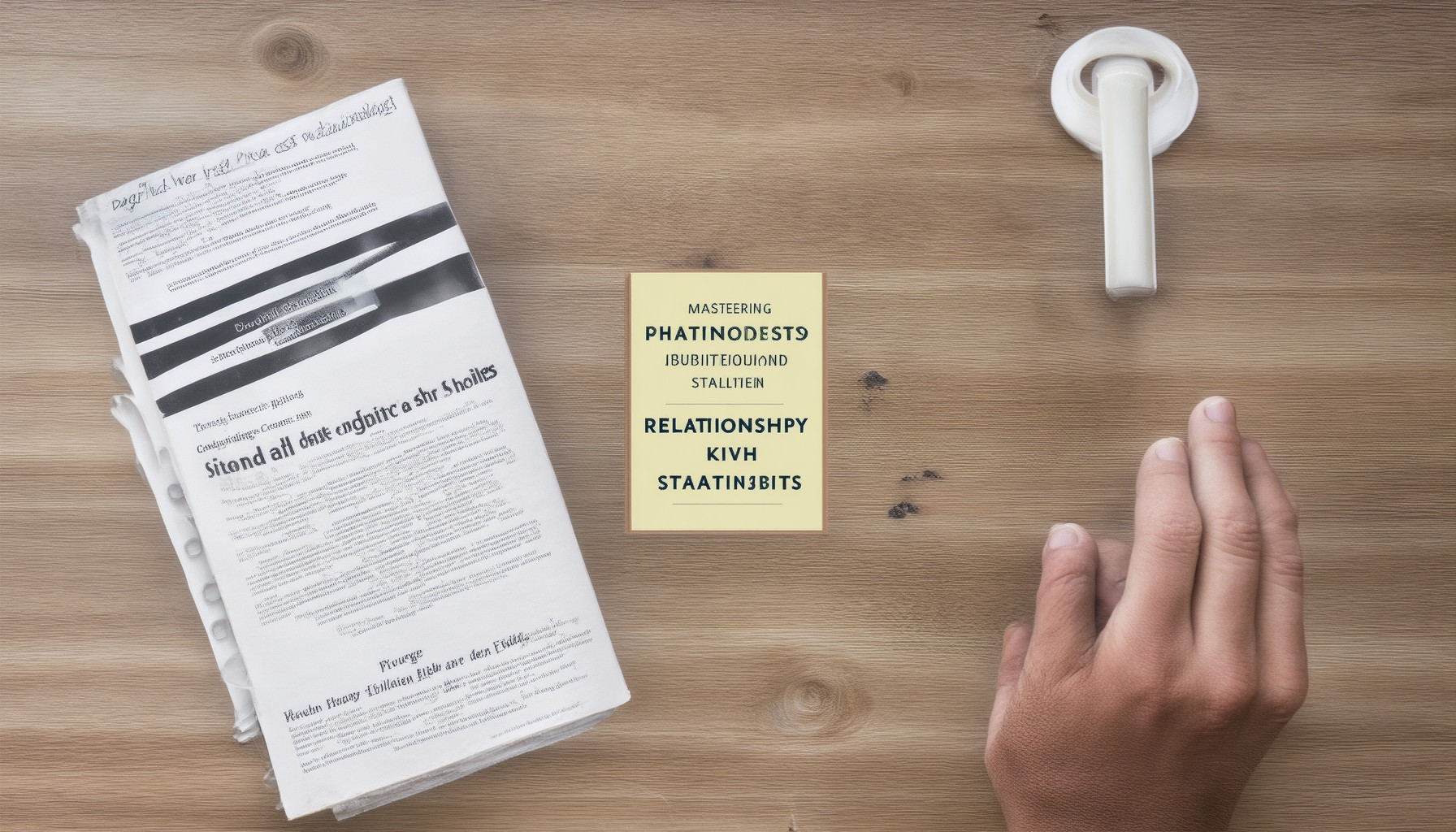Building a strong and lasting relationship often hinges on one crucial yet frequently overlooked aspect: emotional stability. In today’s fast-paced world, couples face unprecedented challenges that can easily disrupt harmony, leaving many seeking effective relationship advice for emotional stability. Emotional stability refers to the ability to maintain calm and balanced reactions even in stressful situations, which is essential for fostering trust, communication, and long-term connection. While some may struggle with emotional instability, leading to conflicts and dissatisfaction, those who master emotional stability tend to experience deeper intimacy and resilience. This guide delves into practical advice, real-life examples, and insights to help you achieve emotional stability in your relationships, paving the way for stronger, more meaningful bonds.
Key Takeaways
- Prioritize Open Communication to build trust and reduce misunderstandings.
- Practice Empathy to foster deeper connections and understanding.
- Build Mutual Respect for a stronger, harmonious relationship.
- Prioritize Self-Care to maintain emotional well-being and reduce stress.
- Share Common Goals to align aspirations and enhance teamwork.
- Resolve Conflicts Constructively using calm and non-blaming approaches.
- Foster Trust and Security to create a safe emotional environment.
- Be Flexible and Adaptable to adjust to changing circumstances.
- Cultivate Gratitude to appreciate positive qualities and reduce negativity.
- Offer Support and Understanding during tough times.
- Practice Patience to allow relationships to grow and mature.
- Know When to Compromise to find middle ground and strengthen bonds.
- Prioritize Emotional Intimacy to deepen connections and reduce misunderstandings.
- Address Mental Health Proactively by seeking help and setting boundaries.
- Seek Professional Support when needed to improve relationship dynamics.
- Develop a Support Network for emotional well-being and relationship strength.
- Practice Mindfulness to improve emotional stability and reduce stress.
- Set Realistic Expectations to avoid frustration and build a healthier relationship.
Emotional Stability in a Relationship
Emotional stability in a relationship refers to the ability of both partners to maintain a balanced and healthy emotional connection. It involves effective communication, conflict resolution, and mutual support, allowing the relationship to withstand challenges while continuing to grow.
Key Components of Emotional Stability
- Communication: Open and honest dialogue fosters understanding and strengthens emotional bonds. Active listening and expressing feelings clearly are essential for maintaining emotional balance.
- Conflict Resolution: Addressing disagreements constructively helps prevent resentment. Techniques like “I” statements and focusing on solutions rather than blame promote healing and growth.
- Empathy: Understanding and sharing each other’s emotions builds deeper connections. It allows partners to offer support during difficult times.
- Trust: Building and maintaining trust creates a secure foundation. It ensures that both partners feel safe sharing their thoughts and concerns.
- Mutual Support: Encouraging each other’s individual goals and celebrating shared achievements fosters a sense of partnership and belonging.
Fostering Emotional Stability
To enhance emotional stability, consider these practical tips:
- Schedule regular check-ins to discuss feelings and experiences.
- Practice gratitude by acknowledging positive moments daily.
- Seek external help, such as counseling, if needed.
- Stay connected through shared activities and meaningful conversations.
By prioritizing emotional stability, couples can build resilient relationships that thrive despite life’s ups and downs.
How to Fix Emotional Instability: A Comprehensive Guide
Emotional instability can be overwhelming and impact various aspects of life. Here’s a structured approach to address it effectively:
1. Understand the Root Causes
- Identify Triggers:** Reflect on recent life changes or stressors that may contribute to your emotional state.
- Seek Professional Insight:** Consider consulting a therapist for a tailored understanding and guidance.
- Explore Online Resources:** Use platforms like GoodTherapy or Psychology Today to find reputable therapists near you.
2. Practice Mindfulness and Emotional Regulation
- Mindfulness Apps:** Try apps like Headspace or Calm for guided meditation sessions daily.
- Cognitive Behavioral Techniques:** Learn to reframe negative thoughts using CBT principles found in books like “The Feeling Good Handbook.”
- Dialectical Behavior Therapy (DBT):** Look for DBT programs or workshops to enhance emotion regulation skills.
3. Establish Healthy Boundaries
- Practice Saying No:** Start with minor requests to avoid burnout and set clear limits in relationships.
- Join Support Groups:** Engage with communities on Meetup or Eventbrite to share experiences and gain support.
4. Incorporate Physical Activity
- Start Small:** Begin with short walks or yoga sessions using apps like MyFitnessPal for motivation.
- Stay Consistent:** Aim for regular physical activity to boost mood and manage stress effectively.
5. Explore Aromatherapy Safely
- Essential Oils:** Use lavender for calmness and eucalyptus for energy, referring to reliable sources like Healthline for safety tips.
- Aromatherapy Diffusers:** Consider diffusers for a soothing atmosphere in your space.
6. Limit Screen Time and Digital Exposure
- Reduce Notifications:** Adjust phone settings to minimize interruptions and schedule digital breaks.
- Become Digitally Mindful:** Allocate specific times for social media to reduce its impact on your mood.
7. Utilize Journaling for Emotional Processing
- Journaling Apps:** Use The Five Minute Journal for concise, daily reflections to track emotions and progress.
- Gratitude Practice:** Keep a gratitude jar or list daily things you’re thankful for to foster positivity.
8. Prioritize Sleep Hygiene
- Create a Bedtime Routine:** Turn off screens early and engage in relaxing activities like reading before bed.
- Optimize Sleep Environment:** Ensure a comfortable bedroom setup to promote better sleep quality.
9. Seek Professional Help When Needed
- Consult Mental Health Professionals:** Don’t hesitate to seek help from licensed therapists or counselors.
- Explore Teletherapy Options:** Consider virtual therapy for convenience and accessibility.
10. Combine Strategies for Holistic Approach
Integrate these methods into your daily routine, adjusting as needed for personal effectiveness. Remember, taking small steps toward improvement is a sign of strength and commitment to your well-being.
By addressing emotional instability proactively, you can regain control and find balance in your life.
How to Control Your Emotions in a Relationship
Controlling your emotions in a relationship is essential for maintaining a healthy and fulfilling connection. Here are some practical steps to help you manage your emotions effectively:
- Acknowledge Your Feelings: Take a moment to recognize and accept your emotions without judgment. This can help you gain clarity and prevent suppression, which may lead to bigger issues down the line.
- Practice Calm Communication: When discussing sensitive topics, express your feelings using “I” statements. For example, say “I feel hurt when…” instead of “You always…” This approach reduces defensiveness and fosters constructive dialogue.
- Enhance Self-Awareness: Pay attention to triggers and patterns in your reactions. Keeping a journal can help identify recurring situations and provide insights into your emotional responses.
- Set Healthy Boundaries: Learn to say no when something feels uncomfortable. This empowers you to protect your emotional well-being and sets clear expectations in the relationship.
- Practice Gratitude: Focus on the positive aspects of your relationship. Listing a few things daily can shift your mindset and strengthen your emotional foundation.
- Engage in Mindfulness Techniques: Use grounding exercises or mantras to stay present. This can help you navigate emotional highs and lows with greater ease.
- Seek External Support: Talk to trusted friends or seek professional guidance when needed. An outside perspective can offer valuable insights and help you process complex emotions.
- Embrace Emotional Release: Allow yourself to express emotions through healthy outlets like exercise, art, or simply talking to someone who understands.
- Let Go of Control: Understand that relationships are partnerships. While you can influence your own behavior, you can’t control your partner’s reactions. Trusting the process and accepting emotions as part of the journey can reduce unnecessary stress.
How to Be Mentally Stable in a Relationship?
Mental stability in a relationship is crucial for building a strong, lasting connection. Here are proven strategies to achieve it:
- Practice Open Communication:** Share your thoughts and feelings honestly while actively listening to your partner. Validate their emotions without offering opinions.
- Embrace Empathy:** Put yourself in your partner’s shoes to understand their perspective, fostering deeper emotional connections.
- Build Mutual Respect:** Treat each other with kindness and understanding, recognizing each other’s strengths and weaknesses.
- Prioritize Self-Care:** Maintain your well-being through healthy habits, hobbies, and sufficient sleep to manage stress effectively.
- Share Common Goals:** Align your aspirations to work towards a shared future, reducing conflicts and enhancing teamwork.
- Resolve Conflicts Constructively:** Address issues calmly using “I” statements to express feelings rather than assigning blame.
- Foster Trust and Security:** Build trust by being reliable and honest, creating a safe emotional environment.
- Be Flexible and Adaptable:** Adjust to changes in the relationship and life circumstances to maintain harmony.
- Cultivate Gratitude:** Focus on appreciating your partner’s positive qualities and the little things that bring joy.
- Offer Support and Understanding:** Be there for each other during tough times, providing comfort and encouragement.
- Practice Patience:** Understand that relationships require time and effort to grow and mature.
- Know When to Compromise:** Find middle ground to overcome disagreements and strengthen your bond.
- Prioritize Emotional Intimacy:** Spend quality time together to deepen your emotional connection and reduce misunderstandings.
For more insights and practical tips, visit Chris and One to explore resources on relationship health and personal growth.
How do you maintain mental stability in your relationship? Share your experiences or thoughts below!
How to Stop Mental Health from Affecting Your Relationship
Addressing the impact of mental health on relationships requires a thoughtful approach that involves communication, self-care, and mutual support.
1. Open Communication
Initiate an honest dialogue with your partner about how your mental health affects your relationship. Approach the conversation during a calm moment to ensure clarity and understanding.
2. Set Healthy Boundaries
Clearly communicate your needs and limits to prevent emotional exhaustion. Let your partner know when you require space or when certain activities are challenging due to your mental health.
3. Prioritize Self-Care
Engage in activities that promote your mental well-being, such as exercise, meditation, or hobbies. These practices can reduce stress and enhance your interactions with your partner.
4. Seek Professional Support
Consider consulting a therapist who specializes in mental health and relationships. Therapy can provide valuable tools and strategies to manage your condition and strengthen your bond.
5. Leverage Support Networks
Reach out to friends and family for emotional support. Their understanding and encouragement can significantly alleviate your stress and improve your relationship dynamics.
6. Explore Couples Therapy
Couples therapy can be particularly effective in addressing shared challenges. It offers a safe space for both partners to work through issues together and develop coping mechanisms.
7. Maintain Realistic Expectations
Understand that relationships fluctuate and perfect harmony isn’t achievable. Accepting that your partner can’t resolve your mental health issues can reduce pressure and foster a healthier relationship.
8. Take Responsibility for Well-Being
Acknowledge that your mental health is your primary responsibility. Stick to your treatment plan consistently, understanding that progress may be gradual.
9. Practice Patience
Be kind to yourself and allow time for healing. Recognize that adjustments in your relationship may be necessary and view them as opportunities for growth.
By integrating these strategies, you can protect your relationship while actively managing your mental health. Remember, a balanced approach where both partners support each other’s well-being fosters a resilient and adaptive partnership.
How to Remain Emotionally Stable
Emotional stability is crucial for maintaining balance in life. It allows us to handle challenges with resilience and approach opportunities with confidence. Here are some effective strategies to foster emotional stability:
1. Practice Self-Awareness
Understanding your emotions is the first step toward managing them effectively. Take time to reflect on your feelings and recognize triggers that may lead to emotional turmoil. This awareness helps you respond thoughtfully rather than react impulsively.
2. Develop a Strong Support System
Surround yourself with positive influences who uplift and encourage you. A support network can provide comfort during difficult times and offer fresh perspectives when needed. Building these relationships takes effort, but they are invaluable for emotional well-being.
3. Engage in Regular Mindfulness Practice
Mindfulness helps ground you in the present moment, reducing anxiety about the past or future. Techniques like meditation or deep breathing exercises can significantly improve emotional stability by fostering a sense of calm and control.
4. Set Realistic Expectations
Striving for perfection can be overwhelming and lead to frustration. Accepting imperfection and focusing on progress rather than perfection fosters a more balanced emotional state. Celebrate small achievements to stay motivated.
5. Limit Negative Influences
Exposure to negative environments or people can drain your emotional energy. Consciously reduce contact with those who bring negativity into your life. Protecting your mental health is a sign of self-respect and prioritization.
6. Cultivate Gratitude
Focusing on the positives in your life can shift your mindset towards positivity. Journaling about things you’re grateful for helps reinforce this habit, improving overall emotional stability and life satisfaction.
Conclusion
Emotional stability is achieved through self-awareness, strong relationships, mindfulness, realistic expectations, limiting negative influences, and cultivating gratitude. By integrating these habits into your daily life, you can build resilience and navigate life’s challenges with greater ease.









0 Comments